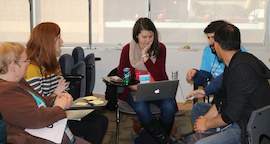Register Now For June Health Hackathon
Thursday, June 2, 2016
Registration is now open for the upcoming Ann Arbor Health Hackathon: Prototyping Disease Prevention. Click here to register and to find out more about the June 24-26 event, which is sponsored by several organizations including WDI.

Round-the-clock hackathons, more commonly associated with software developers and computer programmers building new tech gadgets, have now moved into the global health realm. The Ann Arbor hackathon aims to harness the same spirit of energy, collaboration, and dedication to prevent the spread of disease, said WDI Healthcare Research Associate Beatrix Balogh, one of the event organizers.
Health-themed hackathons explore new ways to innovate and create new technologies and processes. In February, Balogh participated in a Boston hack where she and her team worked on a training/business model around self-screening for breast cancer in rural areas of Africa. She also spent time taking notes in preparation for the Ann Arbor event.
“We were able to talk to the organizers about things that worked well, things they struggled with,” said Balogh, who works in the market dynamics group of WDI’s Healthcare Research Initiative. “They had a lot of good insights.”
About a year ago, shortly before Balogh and Brittany Johnson, a global health supply chain consultant, attended a hackathon in Cleveland, they began kicking around the idea of bringing a health-themed hack to Ann Arbor. They reached out to Neelima Ramaraju, director of global health initiatives at Ann Arbor’s LLamasoft, a supply chain design firm, to gauge her interest.
“Between the resources, talent, and enthusiasm we have in this community, it seemed like a no-brainer,” Ramaraju said. “So far the community has been very receptive and supportive, validating our reasons for getting started.”
Ramaraju brought in friend Diane Bouis, director of innovation programs at The Inovo Group, a strategic innovation consultancy in Ann Arbor.
Together, the four women formed the nonprofit Ann Arbor Health Hack (A2H2 for short) and started making plans for a hackathon in Ann Arbor this summer.
The event will be held at Palmer Commons on the U-M campus. The organizers are hoping at attract 200-250 students, researchers, and professionals from the biomedical, engineering, IT, design, and public health sectors.
It will focus on disease prevention in developing countries as well as underserved areas of developed countries. Prevention includes creating information tools, enhancing education of patients and caretakers, policy and social engineering. It also includes products and services such as personal and surgical hygiene, family planning, wellness care, diagnostics, vaccines, and medication adherence.
A networking event Friday evening will kick off the weekend, with the hackathon starting Saturday morning. Participants will work through the night until noon Sunday, and present their projects to a panel of judges. The winners receive prize money and potentially a space to incubate their idea along with some seed funding.
In addition to WDI, the other sponsors are: The Inovo Group, LLamasoft, Ann Arbor SPARK, MakeHealth Fest, Gamestart, U-M Institute for Healthcare Policy & Innovation, Oakland County Economic Development and Community Affairs, The SearchLite, and Arboretum Ventures.
Ramaraju said events like hackathons make the global healthcare space more accessible.
“As a complex and highly-regulated field, the healthcare market requires deep domain knowledge to bring about change, making it difficult for a lay coder or maker to have a significant impact on their own,” she said. “A hackathon will bring together the medical, academic, entrepreneurial, and industry minds to generate novel ideas, and hopefully new products that lead to healthier lives worldwide.”
Organizers, who plan to make this an annual event, ask attendees to come with ideas, but not necessarily with a set team. As participants discuss their ideas during the pre-hack mixer on Friday night, organizers hope people will start to gravitate towards projects that appeal to them.
Hackathons are most successful when diverse teams form at the start of the event, Bouis said.
“Bringing together a diverse team of people from different areas can help find solutions that somebody who is a deep specialist would have never found by themselves,” she said. “You cannot do something radically new if you think along the same pathways with the same people you have already thought with and worked with in the past. Mix it up.”
Ramaraju said a hackathon “can energize the community, make people aware of the existing resources, and create collaboration opportunities that wouldn’t have otherwise existed.”
The event, Bouis said, enables people to do great things. It is a conduit for bringing the right people together.
“If something that changes the face of healthcare comes out of the hackathon, that will be immensely gratifying,” Bouis said. “Can I guarantee that there will be any to change the face of healthcare? No, I can’t promise. Is it possible? Yes, and that’s exciting.”
Image courtesy of Global Cancer Innovation Hack-a-thon.
